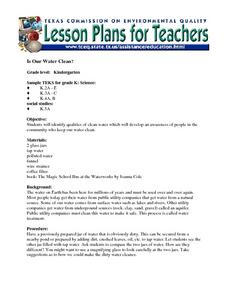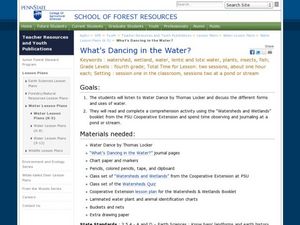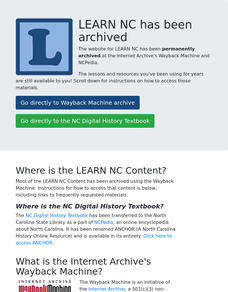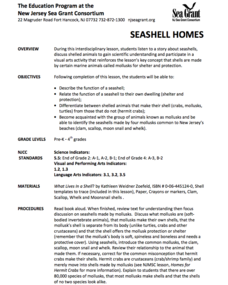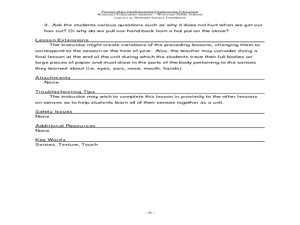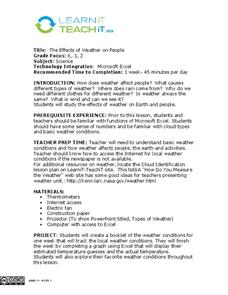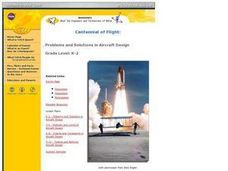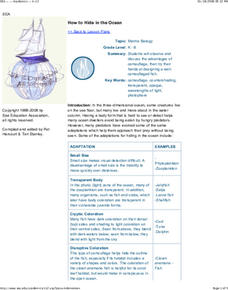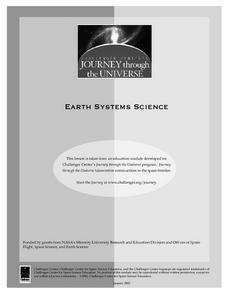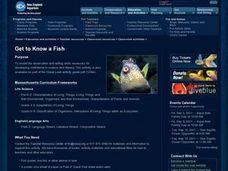Curated OER
Is Our Water Clean?
Students identify qualities of clean water and develop an awareness of people in the community who keep our water clean.
Curated OER
Describing Nests
Students observe bird nests. In this observation level, students explore bird nests using their five senses. Students compare and contrast bird nests while hypothesizing about the need birds have to construct the nest.
Curated OER
Life in a Log
Students identify insects living in rotting logs. In this decomposition instructional activity, students observe pieces of a rotting log, they look at the insects that have inhabited the log and create a chart that shows their findings.
Curated OER
Using a Thermometer
First graders use their senses to formulate questions and make predictions to determine what is in the "Wonder Bag". They hold pieces of ice and examine while listing descriptors on a chart and then take their own temperature using an...
Curated OER
What's Dancing in the Water?
Students learn about watershed, as well as the different forms and uses of water. In this water forms lesson, students brainstorm water sources and uses. Students read the book Water Dance and discuss water examples. Students complete a...
Curated OER
Checking the Weather
Students check the weather on the web site, draw what they see on the calendar (sunny, cloudy, rainy, snowy) and look outside to see if they think the weather on the web site is correct.
Curated OER
Plate Tectonic - Volcanoes
Students watch and learn the different levels of "viscosity" in liquids to explain molten lava after viewing a video of a Hawaiian volcano.
Curated OER
The Environment
Students participate in three stations in which they are made aware of the environment, ways to preserve it, the importance of preserving it and their part in preserving it. They discuss where items are found, recycling, and...
Curated OER
Where are all the Animals?
Students view animals that camouflage at the Shedd aquarium website. In this camouflage lesson, students recognize that there are different types of camouflage, cryptic coloring, counter-shading, warning coloration and mimicry. Students...
Curated OER
Seashell Homes
Pupils listen to a story about seashells. They discuss shelled animals. Learners describe the function of seashell. Pupils relate the function of a seashell to their own dwelling. They differentiate between shelled animals that make...
Curated OER
Engineering the Senses
Students become aware of texture and the sense of touch. In this senses lesson, students become aware of their dominant hand. Students draw pictures using texture. Students describe a texture of an item in a mystery bag.
Curated OER
Healthy Living: Multicultural Awareness and Appreciation Adaptation
Students recognize a globe and distinguish between land and water, as well as recognize different cultures. They become knowledgeable regarding geography and cultural diversity.
Curated OER
Sound
Students identify sources and importance of sound, discuss sounds heard on way to school, explain why sound waves can be "seen", and participate in various classroom activities and experiments that illustrate how sound travels.
Curated OER
The Effects of Weather on People
Students discover the causes of different types of weather and it's effect on society. In this environmental instructional activity, students utilize the Internet to examine cloud types, normal weather conditions and the type of weather...
Curated OER
Why Is The Sea Salty?
Students observe how salt concentration increases in water and how salt remains after water evaporates. In this salty sea lesson plan, student use rock salt, water, containers, and strainers to observe that salt increases each time new...
Curated OER
Vermicomposting
First graders investigate composting. In this biology lesson, 1st graders identify ways to use garbage as fertilizer. Students examine soil and compost matter as well as the role of worms in the dirt.
Curated OER
Soil is a Filter
Young scholars examine how to take the impurities out of eater. In this exploratory lesson students complete an experiment on how to filter drinking water.
Curated OER
Problems and Solutions in Aircraft Design
Students watch demonstrations of paper folded designs that do and do not fly and discuss their observations. They identify problems that they, the Wright Brothers, or NASA scientists face when designing an aircraft, and identify...
Curated OER
How to Hide in the Ocean
Students observe the advantages of camouflage. They design a well camouflaged fish of their own.
Curated OER
soil, Water, and Plants
Students examine the relationship between water retention and plant growth by conducting two experiments. They first compare the water retention qualities of clay, sand and loam soil types. Then they use the data from the first...
Curated OER
The Water Planet
Students use NASA photographs and hands-on activities to compare the amounts of land and water on our planet. They discover that the world has five oceans and that they cover seventy percent of Earth's surface. Students learn how this...
Curated OER
Seeds! What is Inside; How does it Grow and Why is it Important?
Students discover the importance of seeds in relationship to nature. In this plant growth lesson plan, students create a collection of seeds and discover the best type of environment to plant them. Students plant their own wheat seeds...
Curated OER
Get to Know a Fish
Students discover the anatomy of a fish by identifying its body parts. In this oceanography lesson, students view a live fish in their classroom and draw a poster of the fish one body part at a time while identifying it. Students...
Curated OER
How Does a Green Plant Grow?
Students of all ages can explore the question "how do seeds grow?", design an experiment to answer the question, predict the outcome of the experiment then conduct the experiment.


